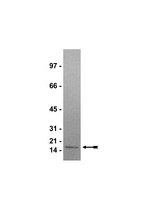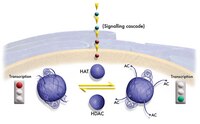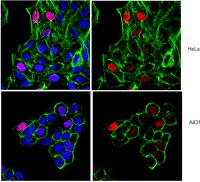Aurora kinase-C-T191D is constitutively active mutant.
Jabbar Khan,Sanaullah Khan,Sobia Attaullah,Ijaz Ali,Shahid Niaz Khan
BMC cell biology
13
2011
Mostrar resumen
Aurora kinases (Aurora-A, B and C) belong to a family of conserved serine/threonine kinases which are key regulators of cell cycle progression. Aurora-A and Aurora-B are expressed in somatic cells and involved in cell cycle regulation while aurora-C is meiotic chromosome passenger protein. As Aurora kinase C is rarely expressed in normal somatic cells and has been found over expressed in many cancer lines. It is suggested that Aurora-C-T191D is not hyperactive mutant. | | 22443468
 |
Histone-modifying complexes regulate gene expression pertinent to the differentiation of the protozoan parasite Toxoplasma gondii.
Saksouk, N; Bhatti, MM; Kieffer, S; Smith, AT; Musset, K; Garin, J; Sullivan, WJ; Cesbron-Delauw, MF; Hakimi, MA
Molecular and cellular biology
25
10301-14
2004
Mostrar resumen
Pathogenic apicomplexan parasites like Toxoplasma and Plasmodium (malaria) have complex life cycles consisting of multiple stages. The ability to differentiate from one stage to another requires dramatic transcriptional changes, yet there is a paucity of transcription factors in these protozoa. In contrast, we show here that Toxoplasma possesses extensive chromatin remodeling machinery that modulates gene expression relevant to differentiation. We find that, as in other eukaryotes, histone acetylation and arginine methylation are marks of gene activation in Toxoplasma. We have identified mediators of these histone modifications, as well as a histone deacetylase (HDAC), and correlate their presence at target promoters in a stage-specific manner. We purified the first HDAC complex from apicomplexans, which contains novel components in addition to others previously reported in eukaryotes. A Toxoplasma orthologue of the arginine methyltransferase CARM1 appears to work in concert with the acetylase TgGCN5, which exhibits an unusual bias for H3 [K18] in vitro. Inhibition of TgCARM1 induces differentiation, showing that the parasite life cycle can be manipulated by interfering with epigenetic machinery. This may lead to new approaches for therapy against protozoal diseases and highlights Toxoplasma as an informative model to study the evolution of epigenetics in eukaryotic cells. Artículo Texto completo | Western Blotting | 16287846
 |



















